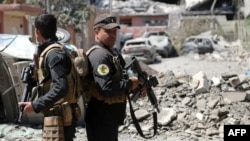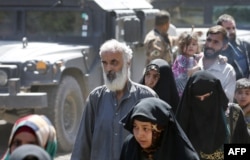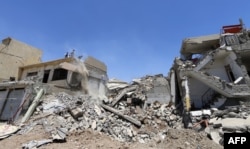Despite vowing that a renewed offensive against Islamic State in Mosul will be a “final push,” Iraqi forces continue to get bogged down in ancient parts of the city where IS remains entrenched.
Days after beginning the latest offensive, the U.S.-backed forces slowed operations late last week, citing the difficulty of protecting residents trapped in remaining IS-controlled areas. Commanders admit the fight for Mosul will take longer than anticipated.
“We are fighting a very difficult battle,” Iraqi Major General Najim Abdullah al-Jubouri told VOA. “It will take at least another month before we liberate the Old City because IS is using civilians as human shields.”
Al-Jubouri said his forces halted their offensive temporarily to open new safe passage routes for civilians fleeing their homes to cross government lines.
“We need to review our plans frequently to change some routes and move to different places based on where fighting is most severe,” he said.
The Iraqi commander said 200 foreign fighters and up to 1,000 local members of IS hold less than 10-square kilometers of Mosul in three neighborhoods to the north of the Old City, as well as inside the Old City itself where there is a dense civilian population.
The United Nations estimates that nearly 200,000 people are facing severe shortages of water and food, and are in danger from crossfire and airstrikes.
"We feel those civilians are probably at greater risk now than at any stage of the entire campaign," Lise Grande, the U.N.'s top humanitarian official in Iraq, told reporters last week.
The complex maze of the Old City makes evacuating civilians increasingly harder, Iraqi and U.S. officials say. The ancient city was built during the Ottoman Empire and includes the eight-century old al-Nouri mosque where IS leader Abu Bakr al-Baghdadi declared IS's self-proclaimed caliphate in 2014. Its narrow alleys prevent the Iraqi forces from bringing in tanks and armored vehicles.
“Liberating these final neighborhoods will be among the most difficult fighting the ISF has faced in their campaign to defeat IS,” U.S. Col. Ryan Dillon, spokesman for the U.S.-led coalition against IS, said last week, using an acronym for Iraqi forces.
Dillon said coalition planes conducted 21 strikes in the past week targeting different IS positions and destroying more than 120 vehicles.
IS militants who took control of Mosul in June 2014 have had years to prepare their defense inside the city.
“They have stationed snipers in the buildings and the minarets of mosques where they fire down on the Iraqi forces,” Gayath Surchi, speaker of the Patriotic Union of Kurdistan party in Mosul told VOA. “They have put civilians in the basements to prevent being hit by airstrikes.”
IS has erected barricades, placed car bombs, and planted mines throughout the city, Surchi said.
“Street combat would have been tough even if there were no civilians,” he said. “Some streets have walls that are one meter thick and made of massive stones and cement.”
Experts say even after IS is pushed from Mosul, its remnants and sleeper cells will continue operating in the city.
“They will definitely continue asymmetric warfare tactics,” Ahmad Majidyar, an expert at the Middle East Institute, told VOA. “They will continue to destabilize Mosul in order to create mayhem to prevent any post-conflict reconstruction and undermine the rule of the government.”











